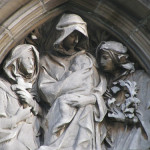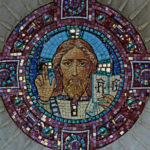We run our website the way we wished the whole internet worked: we provide high quality original content with no ads. We are funded solely by your direct support. Please consider supporting this project.

God Made Visible
During Advent, we celebrate and bring to the forefront of our imagination the God who was made visible. The Gospel of John sums up the advent of God with one sentence: “And the Word became flesh and lived among us, and we have seen his glory, the glory as of a father’s only son, full of grace and truth” (Jn 1:14).
“The Word” refers to God’s thinking and his self-expression. When God thinks, it is Jesus. When God expresses himself, it is Jesus. Notice the singularity of the claim. Jesus is not one Word among others, as though God had more than one mind and more than one mouth. Rather, wherever and whenever God thinks and expresses himself, it is Jesus Christ.
Moreover, it has been this way throughout eternity. The Word is not created. He was “in the beginning with God” and is himself God (Jn 1:2). He has been fellowshipping with the Father from all eternity (Jn 17:5, 24). This means that in knowing Jesus, we are not knowing someone “one step removed” from God. In knowing Jesus we are knowing God himself, God in his eternal essence. In seeing Jesus, we are seeing the very heart of God.
In fact, far from being created, the Word is actually the Creator. John tells us that everything was made by the Word, through the Word, and for the Word (Jn 1:1-3). Creation exists, in other words, as an expression of God and for the purpose of people knowing God. Creation’s purpose is found in Jesus Christ.
The Word is the life and the light of all people (Jn 1:4). God wants people to know him and share in his life (Jn 17:3). Whenever and wherever people experience true life and true light, it is Jesus Christ, whether they know it or not (Jn 1:4, 9). Whereas the enemy covered up the true God in a veil of deceptive darkness that brought death, Jesus turns the light on so we can see who God really is. In doing this, Jesus gives life.
In Christ, we see the glory, the beauty, the fullness, the truth of God. Even though no one previously had ever seen God’s eternal, transcendent nature, now in the Word of Jesus Christ God is made known (Jn 1:18). The invisible God is made visible. In Christ, the previously concealed God has been unambiguously revealed.
—Adapted from Is God to Blame? pages 26-28
Image by Clarisse Meyer via Unsplash
Category: General
Tags: Advent, Glory, Incarnation, Jesus
Related Reading

The Cross in the Manger, Part 2
While some shepherds were tending their flock, an angel appeared to them announcing “good news that will cause great joy for all the people,” for it news about “a Savior…the Messiah, the Lord” (Lk 2:10-11). Most Jews of this time expected a Messiah who would save them by vanquishing their Roman oppressors and liberating Israel…

Aslan Roars: The Atonement as Spiritual Warfare
Greg begins to unpack the Christus Victor view of the atonement by comparing it to the Chronicles of Narnia.

Jesus, the Word of God
“[T]he standing message of the Fathers to the Church Universal,” writes Georges Florovsky, was that “Christ Jesus is the Alpha and Omega of the Scriptures both the climax and the knot of the Bible.”[1] It was also unquestionably one of the most foundational theological assumptions of Luther and Calvin as well as other Reformers. Hence,…

God and Our Political Platforms
Rachel Held Evans posted a blog today on the stir created when Democrats booed the passing of “an amendment to the party platform reinstating language that identified Jerusalem as the rightful capital of Israel and that referred to people’s “God-given potential” in its preamble.” Of course this fed into the belief that if you’re a…

Jesus and the Reality of Spiritual Warfare
In yesterday’s post, we discussed how challenging it can be to believe in the reality of a spiritual realm in the modern world. Today, let’s look at how Jesus’ ministry relates to this spiritual reality. While Jesus and his followers of course believed that God was the ultimate Lord over all creation, they clearly viewed…

Does God Intervene?
Given the vast influence of angelic and human free will, what influence does God have in determining what comes to pass? While God has an important role to play in anticipating and creatively responding to decisions agents make, is God only a responder? Does he have anything to do with what’s going on in creation?…
